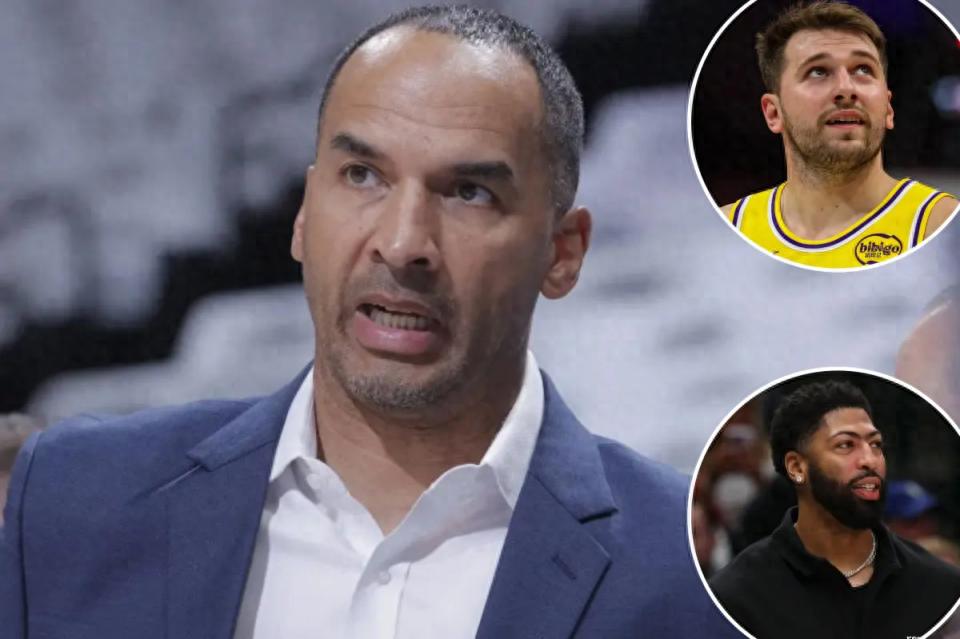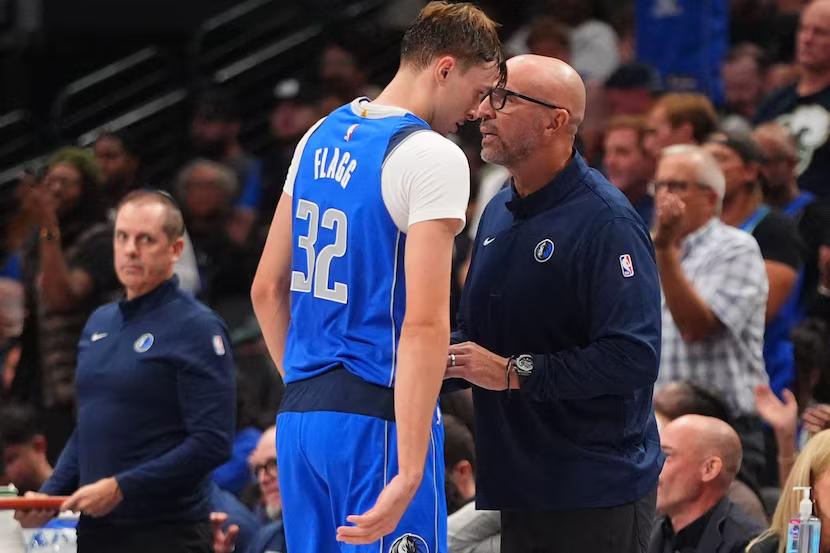Revealing the dismissal of Harrison: The new owner regrets approving the Luka Doncic trade and may next consider trading Anthony Davis.
On November 12th Beijing time, the Dallas Mavericks officially dismissed General Manager Nico Harrison. ESPN then revealed insights into this decision by exploring five questions about Harrison’s outcome. Below is ESPN’s detailed coverage—


Since that stunning night in early February, a well-known chant has reverberated throughout the American Airlines Center. On October 24th, the Dallas Mavericks lost at home to the struggling Washington Wizards, and in the final minutes, the chant rang out again across the arena:
“Fire Nico! Fire Nico! Fire Nico!”
As early as the early hours of February 2nd, when then-Mavericks GM Nico Harrison traded Luka Doncic to the Los Angeles Lakers, Mavericks fans began calling for his dismissal. At that time, 25-year-old Doncic was a homegrown star, a five-time NBA All-First Team selection, and had just finished a Finals appearance.
At the very moment fans chanted, Doncic was scoring 23 points in a single quarter at his new home court in downtown Los Angeles. That night, he finished with 49 points, 11 rebounds, and 8 assists to lead the Lakers to victory, starkly contrasting the Mavericks’ poor performance. This scene foreshadowed the trajectory of the early season weeks and ultimately sealed Harrison’s fate.
According to sources, Harrison was dismissed Tuesday morning after meeting with team owner Patrick Dumont, who now regrets approving the trade involving Doncic.In this trade, Dallas received Anthony Davis, Max Christie, and a 2029 first-round pick, but executives across the league agree that this return is minimal for a player in his prime, consistently an MVP candidate.
“Time will tell if I was right,” Harrison said the day after the trade. Nine months later, time has answered him.
Currently, the Mavericks’ offense ranks near the bottom of the NBA, holding a 3-8 record and sitting second-last in the Western Conference, just ahead of the New Orleans Pelicans. Meanwhile, Doncic is thriving with the Lakers, who have an 8-3 record, averaging 37.1 points, 9.4 rebounds, and 9.1 assists per game, leading the league in scoring. Meanwhile, Davis has only played 14 regular-season games for Dallas, missing most of last season due to an abdominal injury.
Even though the Mavericks secured the top draft pick through historic lottery luck and selected the highly anticipated rookie Cooper Flagg, the shadow of Doncic’s departure still looms over the team. This was evident in Monday night’s home loss to the Milwaukee Bucks—early in the second half, Davis missed his sixth consecutive game due to a left calf strain, leading to a bewildering scene on the court.

Dumont appeared at a game for the first time since the season-opening blowout loss to the San Antonio Spurs and had a friendly conversation with an 18-year-old fan wearing Doncic’s Lakers gold No. 77 jersey.
The fan’s family holds season tickets just a few rows behind Dumont’s courtside seat. He told reporters that, encouraged by his father, he apologized to Dumont—after flipping him off and verbally abusing him late in the October 22nd season opener loss. According to Sports Illustrated, Dumont expressed regret over the Doncic trade.
Meanwhile, many empty seats in the arena displayed placards featuring Davis’s photo with the words: “Make Some Noise!”
Fans indeed made plenty of noise, repeatedly chanting “Fire Nico!” during the fourth quarter.
Why did the Mavericks fire Harrison now? Are they considering trading Davis? Here is everything known about Dallas’s current situation.
1. Why fire Harrison now?
The situation in Dallas has become untenable. Dumont has lost trust in Harrison, most clearly shown by his support for the medical staff’s cautious approach to Davis’s injury over the weekend, unwilling to risk aggravating the calf strain. Harrison’s job uncertainty hangs like a dark cloud over the team.
“It was only a matter of time,” an NBA insider told ESPN Monday afternoon, just hours before the Mavericks squandered a 13-point fourth-quarter lead and lost again.
Dumont decided overnight that waiting was no longer an option; the team needs to move forward immediately.
On Tuesday, Dumont addressed fans in a letter about the decision: “I understand the profound impact of the difficult months past,” he wrote, “Please believe I am fully committed to the Mavericks’ success… Our goal is to bring winning basketball back to Dallas and capture a championship.”
2. What is the biggest problem in this poor start?
Beyond the ongoing negative atmosphere, the most severe issue is the abysmal offensive performance—the team suffers a major void in scoring creation and playmaking.

“There’s a ‘Doncic-sized’ hole in the roster,” said an executive from a Western Conference team.
Before the weekend, the Mavericks’ offensive efficiency ranked last in the league, now just above the injury-plagued Indiana Pacers, scoring only 104.2 points per 100 possessions.
In the first seven games, coach Kidd tried playing 18-year-old Flagg at point guard—a position he had never played at any level—before abandoning the experiment. This summer, the team signed veteran journeyman D’Angelo Russell to temporarily replace injured star Kyrie Irving, but after three poor starts, Kidd switched to Brandon Williams Monday night.
“The team lacks a point guard, a floor leader,” said an Eastern Conference scout. “That’s the primary issue. Then you try to make someone who isn’t a point guard play that role.”
“The coach clearly does not trust the summer signing. They don’t have faith in him as a leader on the floor, which aligns with the league’s general consensus. The team lacks shooting and playmaking, both essential for a quality offense.”

The Mavericks rank last in the league in three-pointers made (9.6 per game) and three-point shooting percentage (29.5%).They also rank 27th in assists (27.7 per game). Given the roster’s heavy focus on interior players, these weaknesses were predictable.
“It’s unbelievable that Nico didn’t bring in a quality guard this summer to help the team win,” an Eastern Conference executive said. “This was a clear opportunity for improvement.”
3. What is the locker room atmosphere like?
The vibe inside the American Airlines Center is extremely oppressive; the Mavericks even consider their home court a disadvantage. “These people don’t want us to win at all,” a team insider quoted a player complaining.
The Mavericks have a packed home schedule this season, making it harder to maintain good morale. Their current home record is just 2-5. While no player fights have broken out, accumulating losses make it difficult to keep spirits high.
“For me, this is the losingest stretch of my career, at least as far as I can remember,” said Flagg, frustrated after the November 5 home loss to the New Orleans Pelicans. That defeat temporarily dropped Dallas to last place in the Western Conference.
Center Gafford admitted after Monday’s loss that fans’ focus on firing Harrison “sometimes” frustrates players.
“But we all know our responsibilities,” Gafford said. “Ultimately, winning back our fans’ hearts will be a long season.”
4. What’s next for Davis?

The biggest question about Davis now isn’t when he will recover from his calf strain, but whether the team will consider trading the 32-year-old big man—something that would have been impossible if Harrison remained in charge of basketball operations.
Several executives and scouts around the league believethat as the Mavericks shift toward building around Flagg, trading Davis is a logical move.However, the earlier trade to build a championship roster around Doncic cost the team first-round picks from 2027 to 2030, posing inherent challenges to rebuilding.
“They have Flagg, but the roster is aging and they lack their own draft picks,” said a Western Conference decision-maker. “If necessary, they must accept taking a step back and be patient. This year they need to tank, but I don’t think Dumont is willing to accept that. As a new owner, it doesn’t make sense.”
Due to Davis’s health concerns, his trade market outlook remains uncertain, but when healthy, he remains a dominant two-way player. Multiple league sources insistthat evaluating his trade value over the coming months is a due diligence step Dallas must take—clearly, the 3-4 year championship window Harrison hoped for has vanished.
“They can’t run two timelines anymore,” said a Western executive. “They should ‘take what they can get’ regarding a Davis trade. At this point, I’m not sure what they could get in return.”
5. What are the management’s next steps?

Assistant General Managers Michael Finley and Matt Riccardi have been promoted to interim heads of the team’s basketball operations.
Minority owner Mark Cuban mistakenly believed he could continue to control basketball operations when he sold majority ownership to the Adelson and Dumont families in December 2023.Sources say Cuban has plans for management’s future and hopes to hire former Utah Jazz VP and GM Dennis Lindsey. Lindsey is currently the second-in-command in Detroit Pistons’ front office and served as a senior advisor for the Mavericks in 2023-24, contributing to the personnel moves around Doncic’s Finals roster build.
It remains unclear how Dumont views Cuban’s plans, but the two have communicated frequently in recent months—a stark contrast to last season when Cuban was completely excluded from basketball operations and unaware of the Doncic trade. This summer, the Knicks sought to hire Jason Kidd as head coach, but the Mavericks refused to release him, later signing Kidd to a multi-year extension during the preseason.


Wonderfulshortvideo
Will never get tired of seeing this 😮💨


Wemby was HOT from three in the first half 🎯


Dylan Harper with AUTHORITY 💥


Martin Luther King III & Andrea Waters King in Atlanta for Martin Luther King Day 👏


What a


Cooper Flagg is locked in tonight 🔒


THIS SLAM WAS VICIOUS 😤








 Links
Links
 Contact
Contact
 App
App


